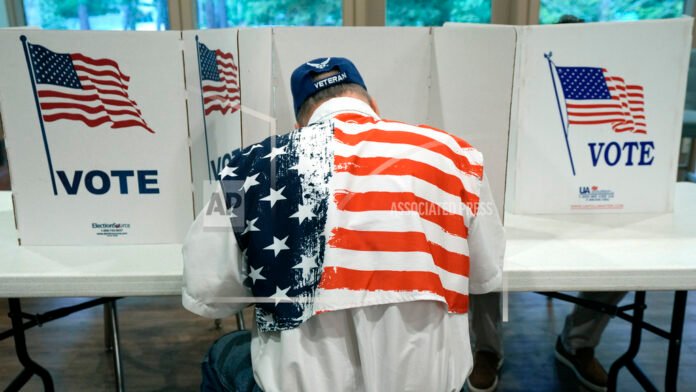WASHINGTON (AP) — Think of it as the Mississippi Primaries: The Sequel. On Tuesday, voters in the Magnolia State will head back to the polls to resolve a handful of state legislative contests from the Aug. 8 primaries in which no candidate reached the vote majority needed to advance to the November general election.
Six runoff primaries, three apiece for Republicans and Democrats, will be held in House districts scattered throughout the state, stretching from the northern border with Tennessee to the southern tip of the Gulf Coast.
In District 66, located in heavily Democratic Hinds County and including parts of Southwest Jackson, two candidates are vying to replace outgoing Rep. De’Keither Stamps, who is running for the state Public Service Commission. Fabian Nelson, owner of a local real estate firm, faces Roshunda Harris-Allen, an alderwoman for the city of Byrum and a professor at Tougaloo College’s School of Education. Nelson, who would become the state’s first openly gay lawmaker if elected, led Harris-Allen in the Aug. 8 primary, 43% to 31%.
In District 115, located in Harrison County on the Gulf Coast and including Biloxi, former police officer Zachary Grady and Biloxi City Councilmember Felix Gines compete to replace retiring GOP Rep. Randall Patterson in the Republican runoff. Grady was the top vote-getter in the primary, receiving 47% of the vote to 38% for Gines. If elected, Gines, who switched parties in December, would become one of only two Black Republicans to serve in the Mississippi House since Reconstruction. The other will be Rodney Hall, a recent aide to GOP Congressman Trent Kelly and former Army veteran who won the Republican primary in District 20 earlier this month and faces no opponent in November.
Additional Republican runoffs will be held in District 2 in northern Mississippi’s Alcorn County and District 105 in Perry, Greene and George counties east of Hattiesburg, while Democrats will also hold runoffs in Districts 69 and 72 in Hinds and Madison counties in central Mississippi.
Control of the Mississippi House is not at stake in November, as Republicans hold a solid majority in the chamber.
Here’s a look at what to expect on election night:
ELECTION DAY
Polls close statewide at 8 p.m. ET or 7 p.m. local time (CT).
WHAT’S ON THE BALLOT
The Associated Press will declare winners in six primary runoff elections in Mississippi: Republican contests in Districts 2, 105 and 115 and Democratic contests in Districts 66, 69 and 72. The winners will advance to the general election on Nov. 7.
WHO GETS TO VOTE
The runoff primary is limited only to voters who cast ballots in the Aug. 8 primary election in districts where no candidate received a majority of the vote. Voters may participate only with the same party as they did in the Aug. 8 primary.
DECISION NOTES
State legislative runoffs tend to be relatively low-turnout affairs in which a handful of votes could decide the election. This may slow the race-calling process in particularly close contests where just a few absentee or other untallied ballots could play a decisive role in determining the result.
The AP does not make projections and will declare a winner only when it’s determined there is no scenario that would allow the trailing candidate to close the gap. If a race has not been called, the AP will continue to cover any newsworthy developments, such as candidate concessions or declarations of victory. In doing so, the AP will make clear that it has not yet declared a winner and explain why.
There are no mandatory recounts in Mississippi.
WHAT DO TURNOUT AND ADVANCE VOTE LOOK LIKE
As of July 28, there were 1.9 million active voters registered in Mississippi. The state does not register voters by party.
Turnout in the Aug. 8 primary for governor was about 18% of registered voters for Republicans and about 9% for Democrats. In 2019, turnout was 19% for Republicans and 15% for Democrats.
The number of votes cast for runoffs tends to trail that of the initial election. In the Aug. 8 primary, the six districts that were forced into runoffs posted vote totals of just a few thousand each, the largest being District 105 with about 6,400 votes cast and the smallest being District 115 with about 1,700 votes cast.
Relatively few Mississippi voters cast ballots before Election Day. The state does not allow in-person early voting and allows absentee-by-mail voting only for those who provide a valid excuse. In the 2018, 2020 and 2022 state primaries, only about 4% voted by absentee ballot. The state reported a total of 2,601 absentee ballots received across all runoff districts as of Tuesday, out of almost 6,106 total absentee ballots requested by voters. Absentee ballots must be postmarked by the day of the runoff, Tuesday, and must be received by Sept. 6.
HOW LONG DOES VOTE-COUNTING USUALLY TAKE
In the Aug. 8 primary for governor, the AP first reported results at 8:19 p.m. ET. The election night tabulation ended shortly after 3:08 a.m. ET with 94% of the votes counted.
___
___
Cover Photo: A patriotic voter sits at a voting kiosk and selects his choices in a party primary in Jackson, Miss., Tuesday, Aug. 8, 2023. Voters are casting their ballots in party primaries in a number of county and statewide elected offices. (AP Photo/Rogelio V. Solis)




